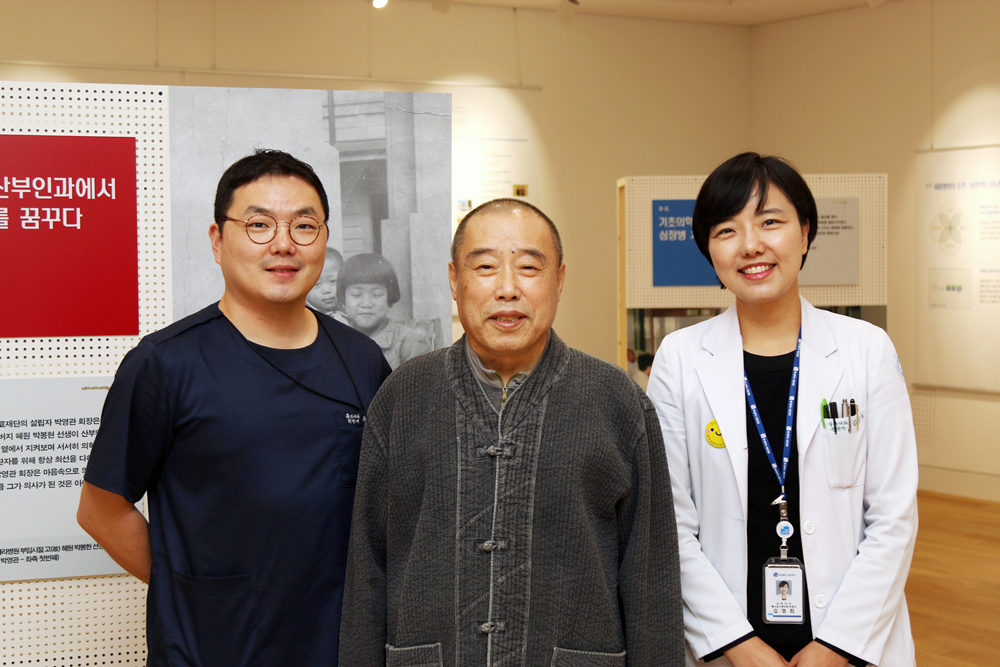News&Notices
Sejong Hospital successfully completed heart transplantation of longest distance in Korea in short time
- Date : 2018-04-02
◎ 61-year-old patient with cardiomyopathy discharged in healthy condition with heart transplanted from Jeju
◎ Breaking the record of longest-distance transplantation (Busan->Bucheon Sejong Hospital) in 1994 by private hospital using helicopter for the first time

▲ Dr. Yu Jae-suk (left), head of the department of cardiothoracic surgery in Bucheon Sejong Hospital, Dr. Kim Gyeong-hee (right), head of Heart Transplantation Center and department of cardiology of Mediplex Sejong Hospital, and Mr. Lee Mun-bok (male, 61,alias, center) who received heart transplantation of longest distance in Korea are taking photo to celebrate the patient’s discharge.
“I finally saw the miracle after waiting for 150 days. I will continue my donor’s unfinished life to be fully devoted in giving others.”
Mr. Lee Mun-bok (male, 61, alias) who has received the heart transplantation of the longest distance in Korea, recovered his health and was finally discharged from Mediplex Sejong Hospital on March 8 (Thursday).
The exclusive team for heart transplantation, headed by Dr. Kim Gyeong-hee (Head of the Heart Transplantation Center) from the department of cardiology of Mediplex Sejong Hospital and Dr. Yu Jae-suk from the Department of cardiothoracic surgery in Bucheon Sejong Hospital extracted the heart of the donor in Jeju Halla Hospital at 10 AM on January 29th (Mon), transported the organ to the Jeju Airport, shipped it to the Kimpo Airport via Korean Air at 11 AM, carried it to Bucheon Sejong Hospital in an ambulance at 12 PM, and successfully transplanted it to Mr. Lee Mun-bok with cardiomyopathy and aortic stenosis. The organ travelled approximately 600km.
In 1994, Sejong Hospital was the first private hospital to use a helicopter to successfully transplant the heart of a donor in Busan in the beneficiary in Bucheon, which was the longest-distance heart transplantation at that time. The heart transplantation team has been restructured and then reactivated since 2015, prior to this successful longest-distance transplantation between Jeju-Gyeonggi to prove the institution’s excellence once again as the only special hospital for the heart in Korea.
When registered in the waiting list for heart transplantation on the KONOS (Korean Network for Organ Sharing, Korea Centers for Disease Control and Prevention), patients are ranked according to a set of strict evaluation criteria. Heart transplantations are conducted with the hearts of brain-dead patients all over the country, according to the ranks on the waiting list.
For heart transplantation, the time taken and to make the organ to beat again (myocardial ischemic time) is key to success. When the myocardial ischemic time exceeds 4 hours, the heart is likely to cause problems. This transplantation took 3 hours and 30 minutes from extracting the heart of the donor to heart anastomosis in the beneficiary.
Dr. Yu Jae-seok, the head of the department of cardiothoracic surgery in Sejong Hosptal, commented that “it was a difficult case, considering the long distance from Jeju, the farthest point in Korea, and the patient with severe adhesion due to previous heart surgery. It was fortunate to successfully finish the operation within 4 hours.” He also emphasized “the huge significance of this successful longest-distance transplantation that inspired confidence in safe and quick heart transplantations in Sejong Hospital from donors anywhere in the country.”
Dr. Kim Gyeong-hee, the head of the department of cardiology in Mediplex Sejong Hospital and head of the Heart Transplantation Center, commented that “all processes from extraction to transplantation went smoothly, through the cooperation from medical institutions, airlines, and airports” and then predicts “Mr. Lee Mun-bok’s fast recovery and healthy daily routines”.
As a leading institution in heart disease treatment in South Korea, Bucheon Sejong Hospital resumed its operation of heart transplantations, that had been suspended in the 1990s, in June 2016 to give new lives to patients in the last stage of heart failure.



